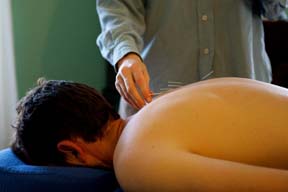In this scientific era, proof that a treatment is effective is often valued over first-hand experience. Western research relies on standardized protocol and isolating variables to obtain reliable results. Although this is an understandable approach when desiring concrete and repeatable outcomes, it is not compatible with the methods of traditional Chinese medicine. When utilizing the scientific method to test the validity of acupuncture, this approach can create erroneous and misleading results. One of the strengths of acupuncture lies in its ability to individualize treatments. Asian medicine views the person as a whole and does not isolate symptoms when treating. Since individuals with the same syndrome can have a different diagnostic pattern, it is inappropriate to give the same treatment. The internal cause of a disease is unique to the individual. We aren’t all the same.
It gives misleading results when acupuncture related research standardizes treatments for specific ailments. This approach essentially turns acupuncture protocols into a Western medicine approach to treatment. Although research done in this way has shown some positive results for acupuncture treatments, it is still an incorrect way to approach acupuncture treatment protocols. An aspect of what makes acupuncture and Asian medicine such a powerful tool is its ability to custom fit treatments to the individual’s needs. Since the individualized treatment is not measurable or repeatable amongst a group, it is hard to fit traditional acupuncture into the Western scientific approach. It is like trying to squeeze a circular peg into a square hole.
Standardized treatments have the potential to be inappropriate to the specific individuals in a study. An aggressive treatment protocol given to a deficient patient can further aggravate their syndrome. Since there is an ethical concern in mistreating a patient, research done with set protocols have the potential of being problematic.
When acupuncture treatments are standardized, significant diagnostic tools, such as tongue and pulse diagnosis, are not utilized. These tools are an essential aspect of providing correct treatment. An ideal treatment is specific to the individual. Also, some acupuncture research has tested for therapeutic results utilizing incorrect procedures and or lengths of treatment. There have been several studies that test a single point only, instead of in combination, as is traditionally done. Also, many studies administer acupuncture treatments for 15 minutes or less and may give only one treatment rather than a series of treatments. This length of time and amount of treatments may not be enough to elicit a therapeutic result. These are some significant issues within acupuncture related research since incorrect treatment has the potential to give false and misleading results.
I have recently heard about some research that has allowed the acupuncturists to do a differential diagnosis and individualized treatment for each patient within the research project. This approach offers an adequate representation of the effectiveness of acupuncture. Although it has a weakness in repeatability and isolating variables amongst a group, it is a more accurate representation of the efficacy of acupuncture. I hope that, in the years to come, acupuncture related research will make it a standard practice to allow for differential diagnosis and correct treatment protocols.



